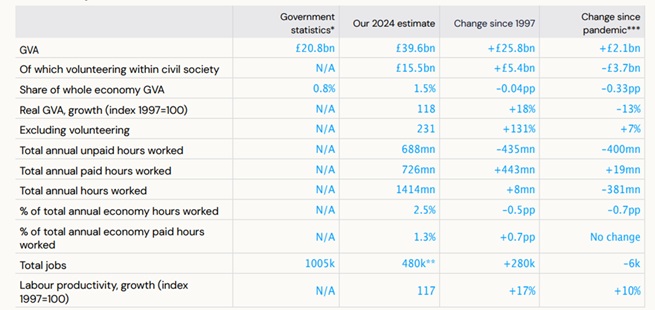Civil society’s true economic contribution is £39.6 billion, nearly double its official figure of £20.8 billion, new analysis by think tank economists shows.
The new report, “Civil society and volunteering: A force for growth?”,commissioned and funded by the Gradel Institute of Charity, provides the most comprehensive assessment to date of the economic value of charities, voluntary organisations, and community groups that make up civil society – including the often-overlooked value of volunteer labour.
The report highlights how official statistics – which follow international accounting rules – significantly understate the sector’s role by excluding volunteer labour. PBE economists adjusted these figures to include the contribution of volunteering.
Key findings from the report include:
- Civil society represented 1.5% of the UK’s economy (Gross Value Added) – compared to the official estimate of 0.8%.
- It contributed 1.4 billion hours of work – 2.5% of all hours worked across the UK economy in 2024.
- Volunteers alone provided 688 million hours of unpaid work, equivalent to £15.5 billion in economic value.
- The sector supports 480,000 paid jobs, alongside its vast unpaid workforce.
- Civil society’s GVA is comparable to the combined output of the UK’s agriculture and car manufacturing industries.
Estimates in the report are based on the NPISH (Non-Profit Institutions Serving Households) sector excluding education and include both paid and unpaid (volunteer) labour.
Report authors also warns that civil society’s potential is being constrained by financial pressures and declining volunteer participation post-pandemic. PBE estimates that the fall in volunteering since 2019 has resulted in a £38.5 billion loss in potential economic value over the past five years.
The report calls for the creation of a civil society satellite account – a tool already used in countries such as the US, Canada, and Australia – to better capture the full economic contribution of the sector. International evidence suggests civil society could account for up to 8% of GDP when properly measured.
Matt Whittaker, CEO at PBE, said:
“Civil society is one of the great unsung heroes of the UK economy. From food banks to youth clubs, from local sports teams to life-saving medical research, these organisations deliver vital services and generate huge social value. But they are also a serious economic force – and our figures show that this contribution is routinely underestimated.“If policymakers continue to overlook civil society’s economic footprint, they risk undermining a sector that supports jobs, skills, health, and resilience across the country. The government must act now to better measure, recognise and invest in civil society’s power to drive sustainable economic growth.”
Sir Stephen Bubb, Director at the Gradel Institute, said:
“A strong and powerful civil society can make a much bigger contribution to the government aim of growing the economy, reforming public services and building the social infrastructure that underpins economic growth.One of the key recommendations of our recent report was for a treasury task force to look at the potential of the sector’s contribution to economic growth and so I was pleased to see in the covenant published last week that the treasury is establishing a forum of third sector leaders to do just that.
By recognising and investing in our sector, we can unlock more growth and build stronger, more resilient communities.”
Below is a full summary of the economic contribution of civil society in 2024: Official government estimates vs PBE’s adjusted estimates

*Government statistics are calculated following international guidance on producing national accounts data.
**PBE estimate for this figure is for 2023.
***Since 2019.
